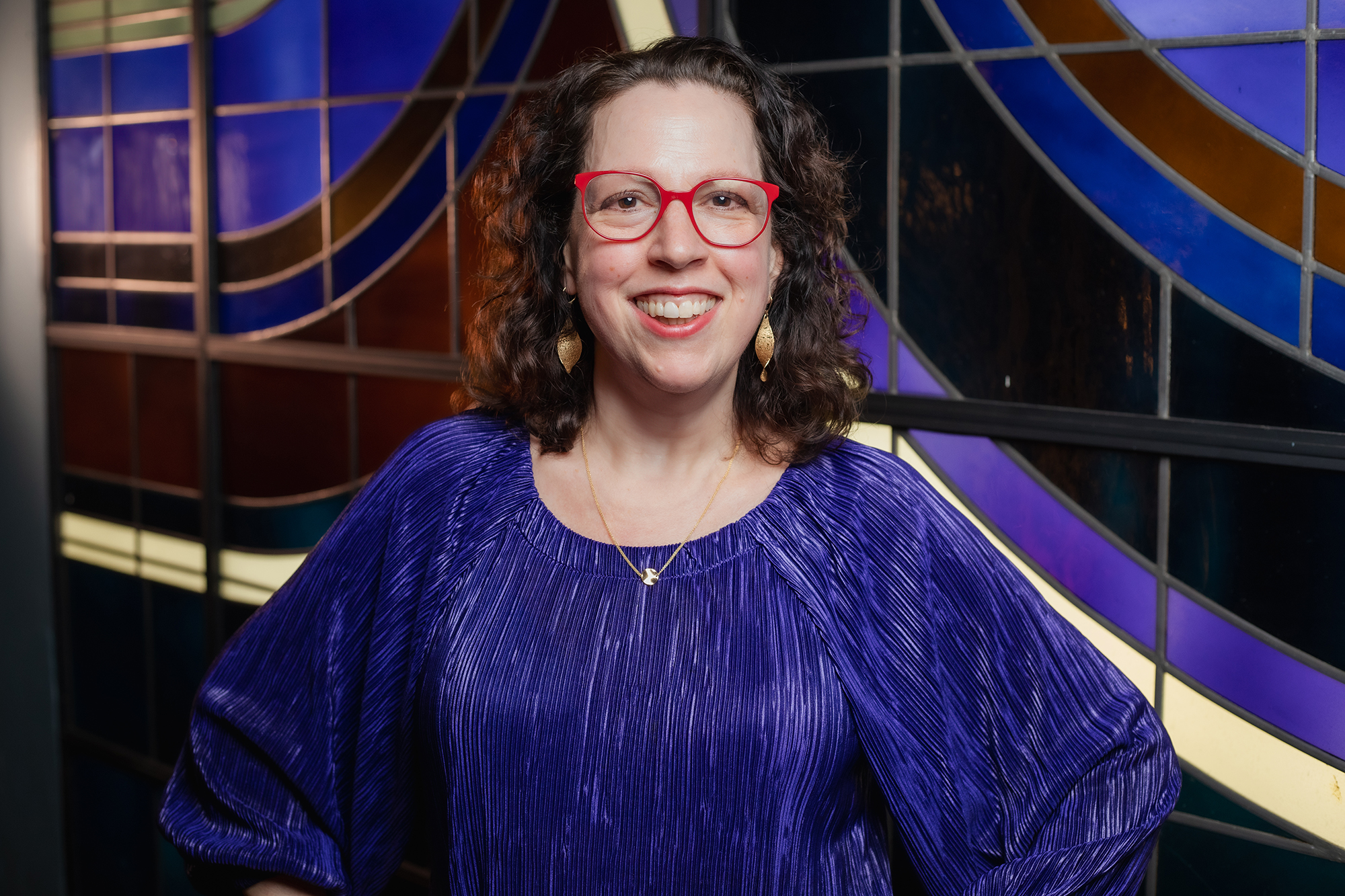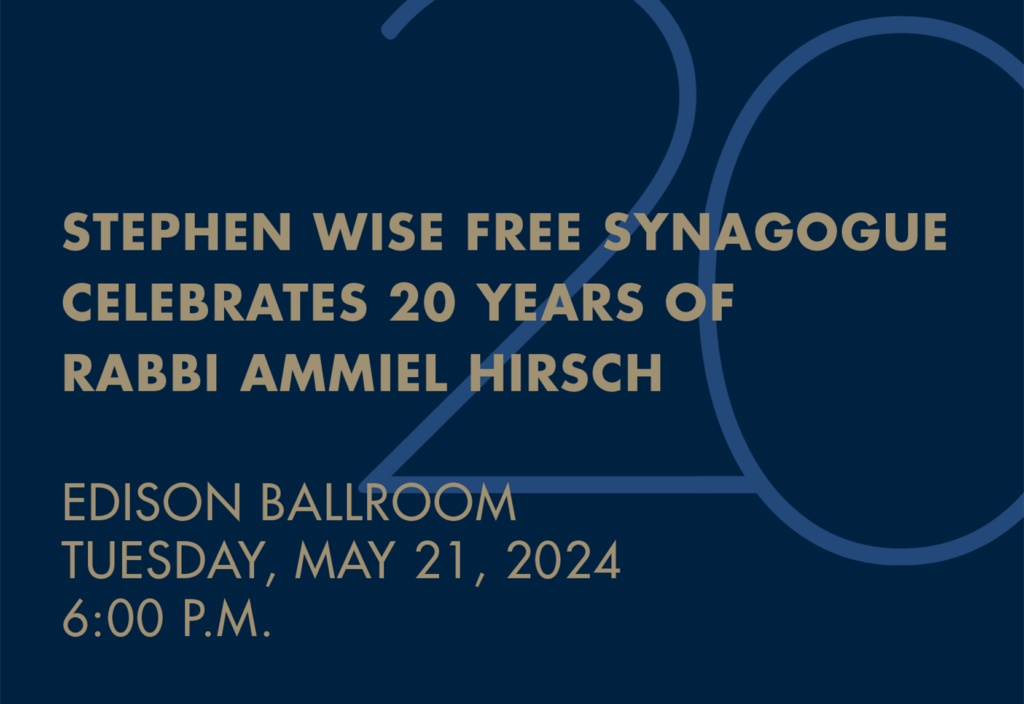
Rabbi Samantha Natov
(She, her, hers)
Associate Rabbi
Email: snatov@swfs.org
Office: (212) 877-4050, ext. 244
Rabbi Samantha Natov grew up in Dundas, Ontario. She holds a bachelor’s from McGill University and a master’s in musicology and ethnomusicology from the University of Virginia. Following her time as a cantorial soloist in Toronto, Rabbi Natov came to New York to earn her degree in sacred music from Hebrew Union College-Jewish Institute of Religion. After working as a cantor at congregations in New Jersey and Brooklyn, she decided to become a rabbi. Rabbi Natov was ordained by HUC-JIR in 2015 and joined Stephen Wise Free Synagogue a few months later in July 2015.
As associate rabbi at Stephen Wise, she oversees the congregation’s adult education programming and social justice work.
Watch Sermons
The Struggle Within
Hired to curse the Israelites, Balam approaches the Israelites’ encampment, but he unexpectedly utters a blessing… “Moments have the potential to go either way,” says Rabbi Samantha Natov. “Inside all of us are competing inclinations.” Which one will win? The one you feed.
Above the Law
Infamous among those excluded from the census in the Book of Numbers was the power-hungry rebel Korah, who was swallowed up by the earth, and the children of Aaron. “Even the sons of the high priest are not above the law,” says Rabbi Samantha Natov. “It is as if the sheer weight of their inflated self-importance pulls them down. And there is a lesson in this…”
The Weight of Ethical Dilemmas
“Relationships have always been fraught with challenges with no simple ethical solutions,” says Rabbi Samantha Natov. This week’s parashah introduces us to the Nazarites, ancient monks who sought to avoid these conflicts and achieve purity by living separately from others. “We might view this as a loss on their part. We are meant to engage in life fully, not hermetically seal ourselves away. The point isn’t to never go astray. It’s about how we come back.”
The Torah is a Mirror
“There are plenty of other texts in the Torah that we would also prefer to ignore, reject, explain away. As modern Jews,what do we do with sacred text that does not resonate with our values?” asks Rabbi Samantha Natov as we look ahead to Shavuot. “We wrestle with Torah. It documents the best and worst of us. It shows us what we are capable of — and sides of ourselves we would prefer not to see…”
I Don’t Know
“How many of us say something and then curate and filter information to support our position – and prove we are right rather than diving into learning about facts and complexities of the situation in Israel and Gaza?” asks Rabbi Samantha Natov. “In Berakhot we read: ‘Teach your tongue to say I do not know!’ And yet, it’s so hard to admit that we don’t know. It takes courage — but it is only when we make room for uncertainty that we open ourselves to truth…”
Ma Nishtanah
People are asking how this year’s Seder will be different, says Rabbi Samantha Natov: “How do we celebrate freedom with so many in captivity? How do we sing of redemption when there is war on every front?” she asks. “In this moment when we feel so broken, we need to sing every song. This is the Jewish way. We keep going. We make a Seder — a kind of protest against the upside-down world we find ourselves in.”
Breaking Negative Cycles
Sometimes anxiety amplifies our worries and we get caught in negative thought loops “that spin on and on,” says Rabbi Samantha Natov. “What does Judaism teach us about breaking these cycles?” she asks and answers…
A Sacred Call
Throughout the stories of Exodus that re revisit again and again and in this week’s parashah, we find a sacred call to answer, says Rabbi Samantha Natov. “What are we being called to do? Who needs our help? What internal spark are we ignoring?” Each of us must interpret God’s call — and determine our response…
Leap of Faith
Taking a leap of faith is challenging for humans, acknowledges Rabbi Samantha Natov. But “if we waited to understand before acting, we might never take a step,” she says. “It is only through living that we gain wisdom.”
Recent Commentaries and Op-Eds
JTA: Torah is the anti-ChatGPT. But we can embrace artificial intelligence without losing our soul.
Apr 20, 2023
“The technology behind ChatGPT is either going to destroy the world or solve all of our problems,” our Rabbi Samantha Natov wrote in JTA News. She weighs the benefits and dangers of our new AI reality – and the drastic ways it will change how we connect with one another.
Gothamist: Where to celebrate Purim in NYC: A guide to the city’s parties, carnivals and more
Mar 4, 2023
Purim is a “celebration of the possibility for one person with a strong moral compass to make a difference,” our Rabbi Samantha Natov tells Gothamist. Head “Into the Spiel” with us this year as we continue our more than 30-year tradition of musical megillahs.
NY1: Why Two Women’s March Events This Weekend Have Caused a Rift
Jan 18, 2019
With concerns still growing over this year’s Women’s March, leaders within Women’s March Alliance are working to distance themselves from the national organization whose leaders have been accused of anti-Semitism. A local offshoot of the national organization is holding a competing event. “It’s really a shame because it stands in the way of so much unity between us,” said Rabbi Samantha Natov of the Stephen Wise Free Synagogue, which held a meeting ahead of the march and where members of the Women’s March Alliance tried to ease fears about the march.
Associated Press: Schism leads to dueling women’s march events in NYC
Jan 18, 2019
Conflicts over control, inclusivity, and alleged anti-Semitism meant that women protesting on the second anniversary of the Women’s March on Washington were faced with competing demonstrations in New York City. Some Jewish groups pulled support for Women’s March Inc. and a Washington state chapter disbanded in protest. The leaders of the Stephen Wise Free Synagogue urged its members to take part in the uptown march, affiliated with Women’s March Alliance. Rabbi Samantha Natov said she still has problems with the Women’s March Inc.’s reaction to allegations of anti-Semitism: “The leadership has not assuaged our most serious concerns,” she said. This story was picked up by The New York Times and The Washington Post, among other outlets.
YNET (Hebrew): American holiday, Jewish values
Nov 23, 2018
YNET spoke to our Rabbi Samantha Natov about how Thanksgiving — a secular holiday — incorporates Jewish values, like tikkun olam, which our volunteers embraced at a Thanksgiving dinner for guests of our on-site Next Step Men’s Shelter.
Kveller: Thanksgiving Is Basically a Jewish Holiday. Here’s Why.
Nov 21, 2018
Our Rabbi Samantha Natov explains how Thanksgiving is profoundly Jewish for a secular holiday, incorporating central Jewish values. “Thanksgiving offers us a chance to replenish ourselves with a sense of gratitude, well-being, and connection. And this is at the heart of Jewish life and practice.”


